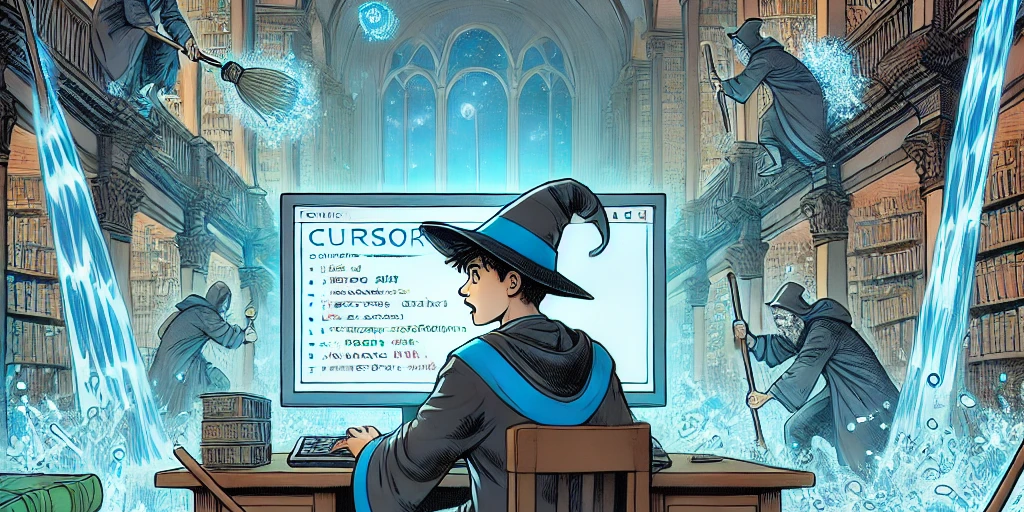Multiplying Brooms - Coding in Mickey's AI Flooded Workshop

Die ich rief, die Geister, / Werd' ich nun nicht los
(The spirits that I summoned / I can’t get rid of now)
Fantasia
The Sorcerer's Apprentice is a classic story about magical powers gone awry due to inexperience and hubris.
It comes from Goethe’s 1797 poem "Der Zauberlehrling.” In the poem, a sorcerer leaves his apprentice alone to do chores. The apprentice, who has observed some of his master's magic but lacks full understanding, decides to use a spell to animate a broom [sic?] to carry water for him.
The spell works initially, but the apprentice doesn't know how to stop it. The broom continues fetching water, flooding the workshop. In desperation, the apprentice splits the broom with an axe, but this only makes things worse as each piece becomes a new broom that continues fetching water. Eventually, the sorcerer returns and breaks the spell, saving the situation but leaving the apprentice humbled.
The Developer’s Spell
Today's software developers are Mickey in a digital workshop. With a few prompts, they can summon code that solves problems. The workaday professional programmer can sniff out problems before they get out the door.
But Mickey's animated broom created a bigger disaster than Mickey could have managed on his own. One bucket at a time, Mickey might have flooded a corner of the workshop. The enchanted mop created a deluge that threatened to drown him.
Similarly, the mistakes a developer makes while learning are bounded by their limited capabilities. They might write inefficient code or introduce a few bugs—problems that are relatively contained and fixable. But when they wield AI, they can generate vast amounts of problematic code at unprecedented speed. Security vulnerabilities multiply. Technical debt compounds. Dependencies intertwine in ways no one fully comprehends.
I refer you now to the near-future, when we will gain fresh understanding of Agnes’ Allen’s Law:
ALMOST ANYTHING IS EASIER TO GET INTO THAN OUT OF
The Sorcerer Returns
In Fantasia's iconic scene, when all seems lost—Mickey drowning amid the chaos he created—the sorcerer returns. With a few commanding gestures, he dispels the magic, returns the mops to their inanimate state, and restores order to the flooded workshop. The apprentice is humbled but saved.
This is perhaps the most crucial part of the tale for our software development parallel. In the real world, who is the sorcerer who can undo the damage of AI-generated code run amok?
Where does the mastery lie? In the tools, or in the Sorcerer?
Mastery doesn't come from wielding powerful tools; it comes from deep knowledge that allows one to control those tools. The returning sorcerer represents what our industry desperately needs: fundamental understanding that transcends the tools themselves.
The "sorcerer" in software development isn't a magical figure who will suddenly appear to fix everything. The sorcerer bears foundational knowledge—understanding algorithms, data structures, system design, and computer science principles. It's the wisdom to know not just how to use AI to generate code, but when not to use it, how to evaluate its output, and how to maintain control over the development process.
Companies that survive the current AI flood will be those that insist on maintaining this sorcerer-level expertise alongside their AI tools. They'll be the organizations that don't abandon training in fundamentals, that require code reviews by engineers who understand what's happening under the hood, and that create guardrails for AI usage.
For individual developers, the lesson is even more direct: don't be content to remain the apprentice. Seek to become a sorcerer. Learn the fundamentals behind the magic. Understand what the code is actually doing, not just that it seems to work. Go beyond LGTM. Develop the expertise to know when the brooms need to be stopped before the workshop floods.
There is no sorcerer coming to save the day, we have to save ourselves.
1 Gall, John. The Systems Bible: The Beginner's Guide to Systems Large and Small : Being the Third Edition of Systemantics. General Systemantics Press, 2002.
2 https://www.dictionary.com/e/acronyms/lgtm/
3 Left as an exercise for the reader: how much of this post was written by Claude?